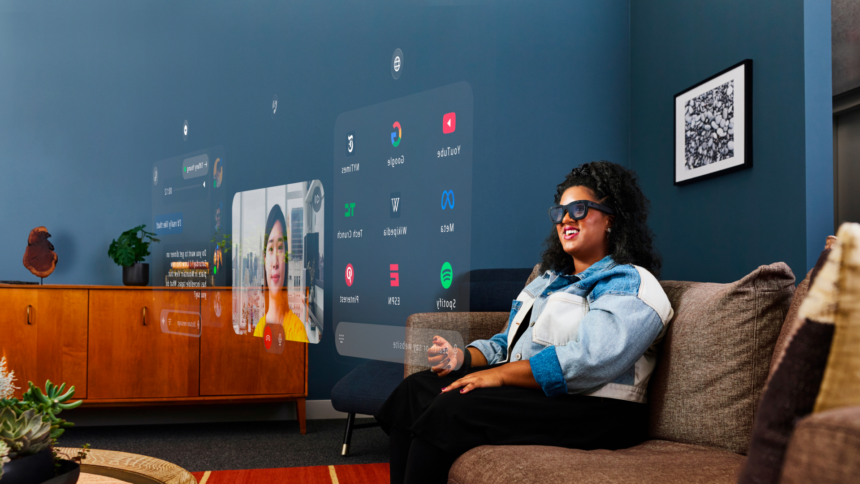Meta’s latest venture into augmented reality, Orion, showcases CEO Mark Zuckerberg’s ambitious plans to shape the future of computing. These AR glasses, although not yet a consumer product, offer a glimpse of what the tech giant envisions as the next big platform after smartphones.
A First Look at Orion: Normal Glasses with Extraordinary Potential
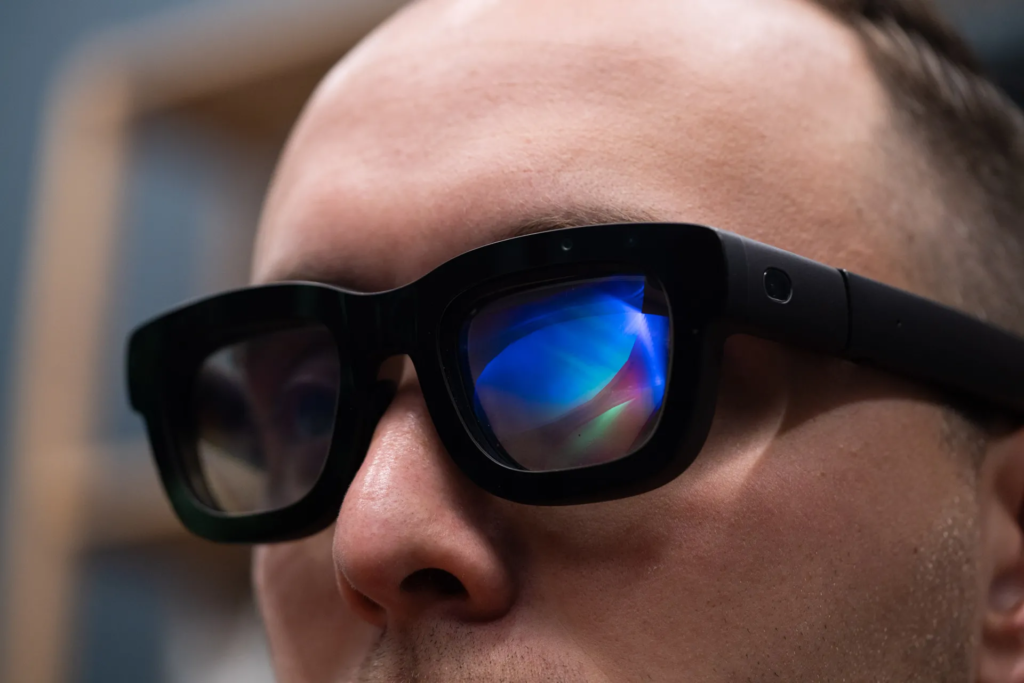
At first glance, Orion looks like an ordinary pair of black, Clark Kent-style glasses. However, these unassuming frames represent Meta’s multibillion-dollar gamble on augmented reality technology. These are not just AR glasses; they are part of Zuckerberg’s long-term vision to replace smartphones as the dominant computing platform. Although originally planned for release, Meta decided to hold off due to the complexity and expense of manufacturing.
The Technology Behind Orion: A Face Computer Like No Other
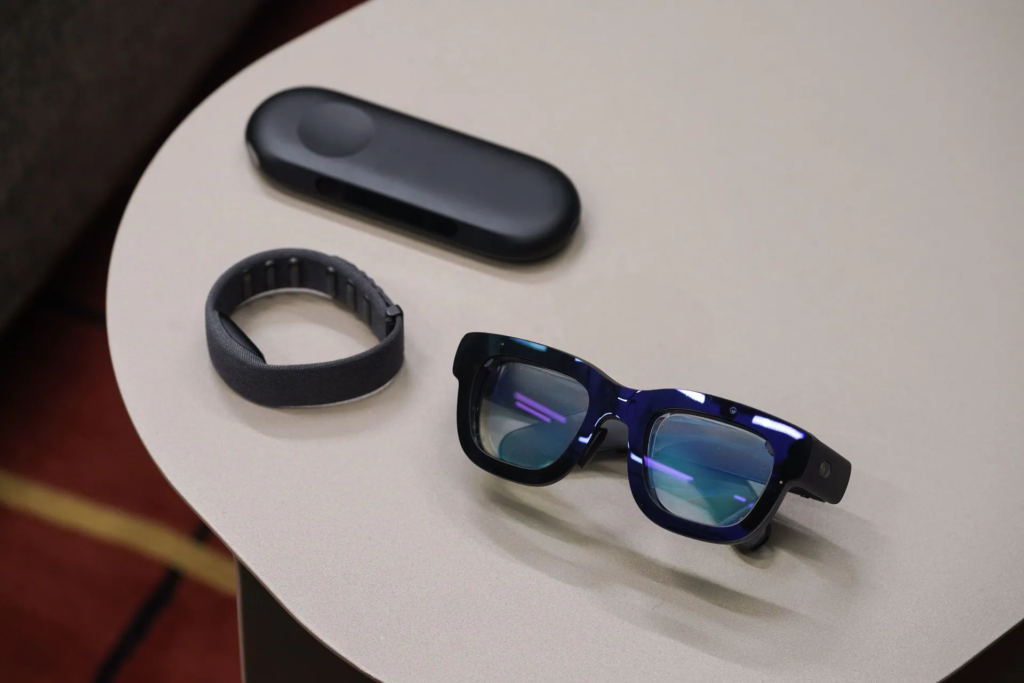
Orion is essentially a high-tech computer worn on your face. A significant leap forward in the world of AR, these glasses feature custom Micro LED projectors that beam graphics into your field of view using waveguides within the lenses. The lenses themselves are made of silicon carbide, a material chosen for its durability, lightweight properties, and its ability to refract light effectively. This allows the projected graphics to cover more of your vision than most AR displays today.
The Display: A Step Forward for AR

One of Orion’s standout features is its display. Previous AR devices have struggled with heavy, low-resolution displays and narrow fields of view. Orion’s Micro LED projectors and silicon carbide lenses address many of these issues, offering a 70-degree field of view and crisp visuals. It’s far from perfect, but it’s a noticeable improvement over what’s currently available in the AR market.
Zuckerberg’s Vision: Holograms and AI Interaction

Mark Zuckerberg envisions Orion glasses serving two primary purposes: holographic communication and interaction with AI. He initially thought holograms would arrive before advanced AI, but the reverse is proving true. During a demo, Meta AI identified ingredients for a smoothie recipe and displayed instructions overlaid on the real world, adding a functional layer to the AR experience.
Holograms and Social Interaction
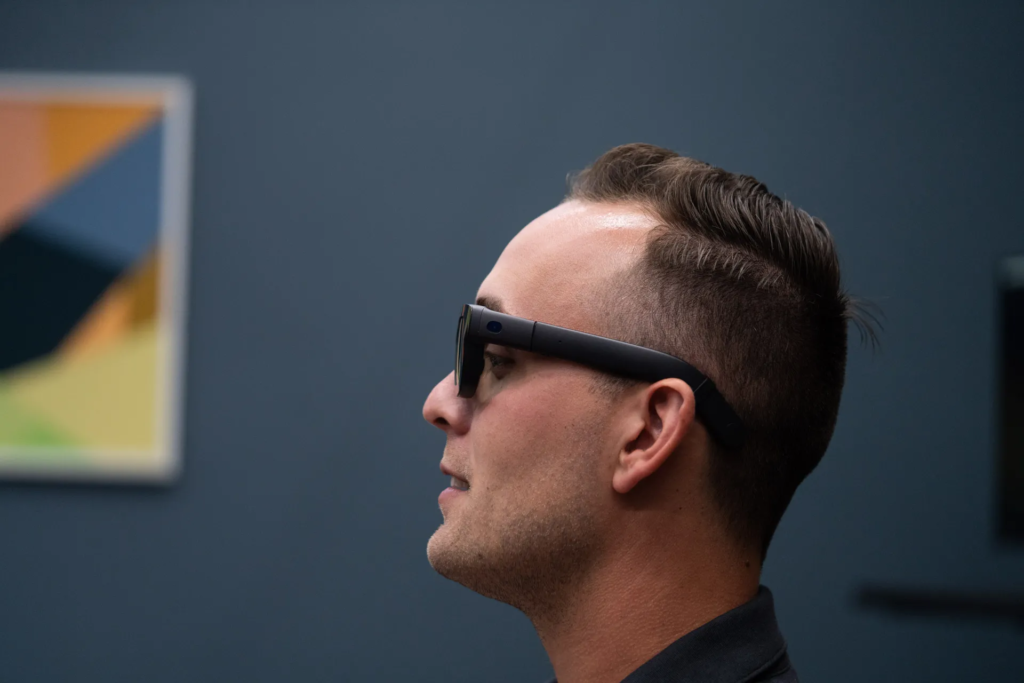
One of the most exciting prospects of Orion is its potential for real-time social interaction. Zuckerberg demonstrated how two people could engage with the same virtual object, like playing a 3D version of Pong using hand-tracked paddles. Despite being a demo, this feature was remarkably smooth, showing how AR could bring new dimensions to social interaction.
Communication Capabilities: Video Calls and Avatar Chats
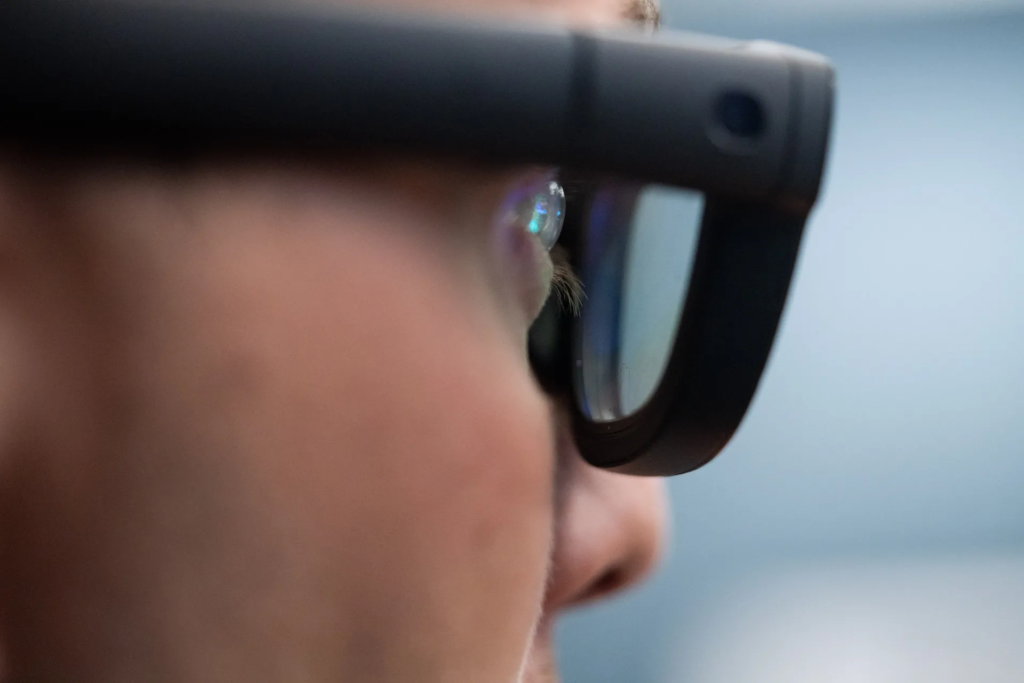
In addition to holographic capabilities, the Orion glasses also offer communication features. During the demo, a video call was placed to an iPhone user via a floating 2D window in the glasses. Though basic now, Meta plans to eventually incorporate avatars that mirror the facial movements of users during calls, enhancing the immersive nature of virtual communication.
Avatar Interaction: A Glimpse into the Future
During the demo, a Meta employee called the user via an avatar. Though still cartoonish and not fully refined, this interaction represents Meta’s vision of how future communication could look: full-body avatars engaging with one another in a shared virtual space, while still rooted in the real world.
Orion’s Hardware: Glasses, Neural Wristband, and Compute Puck
Orion isn’t just a pair of glasses—it’s a whole system. The glasses require two additional components to function: a neural wristband and a wireless compute puck. The wristband interprets neural signals associated with hand gestures, allowing the user to control the glasses. The puck serves as a wireless compute unit, but if separated from the glasses by more than 12 feet, Orion loses functionality.
The Neural Wristband: High-Tech Control in Your Hands
The neural wristband uses electromyography (EMG) to translate neural signals into input. Though it’s not reading your thoughts, it feels close. You can control the glasses with finger gestures, like pinching your thumb and index finger to select objects or using a coin-flipping gesture to scroll. The band even provides haptic feedback, so you know when a gesture has been recognized.
A High-Quality Display, But Limited Battery Life
One of the strengths of Orion is its high-quality display, offering an immersive AR experience with minimal lag. The 70-degree field of view allows for a more expansive AR display, making virtual objects feel part of your environment rather than confined to a small box.
However, there are limitations. The battery lasts only about two hours, making it unsuitable for extended use. While video calls and reading text are clear and engaging, the glasses aren’t ready to replace your devices for tasks like watching a full-length movie.
Orion’s Roadblocks: High Costs and Complex Manufacturing
Originally, Meta had planned to sell the Orion glasses in the tens of thousands by now. However, the manufacturing costs have proven prohibitively high, with each unit costing around $10,000 to produce. Much of this cost stems from the silicon carbide lenses, which are difficult to manufacture at scale.
Meta had hoped silicon carbide would become more widely used in the industry, driving down costs, but that hasn’t happened. As a result, the company has shelved the consumer release of Orion, focusing instead on making around 1,000 pairs for internal and external demos.
Meta’s Future Plans for Orion: The Second Generation
While the current version of Orion won’t be available for purchase, Meta is working on the second generation of the glasses. Executives hint that the new model will feature improvements like higher resolution, increased brightness, and a lower price point. The goal is to eventually offer AR glasses that are as affordable as today’s smartphones and laptops.
Engineering Challenges and the Path Forward
Rahul Prasad, Orion’s product lead, acknowledges that there are still major engineering challenges to overcome. While the field of view and display quality are impressive, Meta is focusing on improving resolution and brightness, as well as making the glasses more compact and affordable. The next version will not use silicon carbide lenses, and the field of view will be slightly smaller to balance these upgrades.
Meta’s Competition: The Race for AR Dominance
Meta isn’t the only company racing to dominate the AR space. Apple has entered the competition with its Vision Pro headset, and Google and Snap are also working on AR technologies. Meta’s track record with hardware, including its Quest VR headset, has been mixed, which raises questions about whether the company can break into the mainstream hardware market with AR.
Conclusion: An Impressive Demo, But the Real Challenge Lies Ahead
Orion represents a significant leap forward in augmented reality, but Meta still has a long way to go before these glasses are a consumer product. The impressive technology behind Orion shows that Zuckerberg’s vision is more than just talk, but the high manufacturing costs and complex engineering challenges make widespread adoption a distant goal.
As Meta refines the technology and prepares for the release of future versions, the AR glasses market remains wide open, with competition from giants like Apple and Google. While Orion is an exciting step forward, the hard work for Meta is just beginning.


